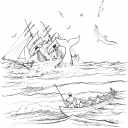Food in the Thirteen American Colonies
The
American colonists got
their food from several places. The modern supermarket that
we know today, where you can get all kinds of food, was not
an option back then.
 People
who lived on the Atlantic coast often caught fish and
whales. They sold fish and whale blubber at fish markets,
which were usually down by the docks.
People
who lived on the Atlantic coast often caught fish and
whales. They sold fish and whale blubber at fish markets,
which were usually down by the docks.
 Farmers
who grew wheat, barley, corn, tobacco, or rice hauled their
crops to a town market, where the crops were sold to people
in that town or to traders who would ship the goods to other
colonies. (These traders would send the goods by boat, on
rivers or along the ocean coast, or on wagons.)
Farmers
who grew wheat, barley, corn, tobacco, or rice hauled their
crops to a town market, where the crops were sold to people
in that town or to traders who would ship the goods to other
colonies. (These traders would send the goods by boat, on
rivers or along the ocean coast, or on wagons.)
A
great many American colonists also took care of their own
food needs. It was not uncommon for a farm family to have
crops  growing
near the ocean while chickens, pigs, and cows were grazing
nearby and for that same family to fish for clams and other
fish down at the oceanside. This way, the family wouldn't
have to buy food from anyone else. They might have apple
trees and rows of corn and wheat. They might turn that corn
into cornbread or cornmeal mush. They might turn that wheat
into flour themselves and use it to bake bread. They might
also hunt wild animals, like deer, rabbits, and
turkeys.
growing
near the ocean while chickens, pigs, and cows were grazing
nearby and for that same family to fish for clams and other
fish down at the oceanside. This way, the family wouldn't
have to buy food from anyone else. They might have apple
trees and rows of corn and wheat. They might turn that corn
into cornbread or cornmeal mush. They might turn that wheat
into flour themselves and use it to bake bread. They might
also hunt wild animals, like deer, rabbits, and
turkeys.
The
farms of the 13 Colonies took up a much larger amount of the
total land available than do farms today. Still, farming is
very much a way of life for many people today, just as it
was for the American colonists.
|
More
on Life in the 13
Colonies
Food
|
Graphics
courtesy of ArtToday



 People
who lived on the Atlantic coast often caught fish and
whales. They sold fish and whale blubber at fish markets,
which were usually down by the docks.
People
who lived on the Atlantic coast often caught fish and
whales. They sold fish and whale blubber at fish markets,
which were usually down by the docks.
 Farmers
who grew wheat, barley, corn, tobacco, or rice hauled their
crops to a town market, where the crops were sold to people
in that town or to traders who would ship the goods to other
colonies. (These traders would send the goods by boat, on
rivers or along the ocean coast, or on wagons.)
Farmers
who grew wheat, barley, corn, tobacco, or rice hauled their
crops to a town market, where the crops were sold to people
in that town or to traders who would ship the goods to other
colonies. (These traders would send the goods by boat, on
rivers or along the ocean coast, or on wagons.)
 growing
near the ocean while chickens, pigs, and cows were grazing
nearby and for that same family to fish for clams and other
fish down at the oceanside. This way, the family wouldn't
have to buy food from anyone else. They might have apple
trees and rows of corn and wheat. They might turn that corn
into cornbread or cornmeal mush. They might turn that wheat
into flour themselves and use it to bake bread. They might
also hunt wild animals, like deer, rabbits, and
turkeys.
growing
near the ocean while chickens, pigs, and cows were grazing
nearby and for that same family to fish for clams and other
fish down at the oceanside. This way, the family wouldn't
have to buy food from anyone else. They might have apple
trees and rows of corn and wheat. They might turn that corn
into cornbread or cornmeal mush. They might turn that wheat
into flour themselves and use it to bake bread. They might
also hunt wild animals, like deer, rabbits, and
turkeys.

